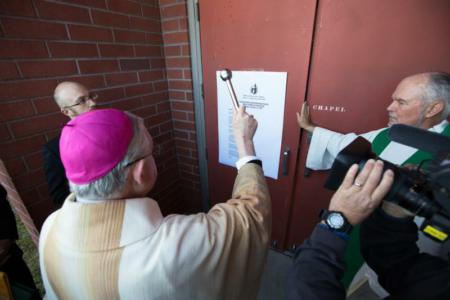Door of Mercy opened at juvenile detention center near L.A.
SYLMAR, Calif. (CNS) -- The young man stood at the end of a table, reading a letter he had received from Pope Francis. The words echoed off the walls of the cavernous room at the Barry Nidorf Juvenile Hall for teen offenders.
"I was pleased to receive your recent letter and to learn that Archbishop Gomez will be opening a Holy Door of Mercy at the Barry Nidorf Juvenile Hall," read Carlos, wearing the hall's winter garb: bulky light gray sweatshirt, dark blue loose pants, black slipper-sneakers. "It brings me great joy to know that you and the other residents are united with the whole church in celebrating this Jubilee of Mercy."
The horn-rimmed glasses gave Carlos a bookish look, but his hair combed straight back was the style similar to that worn by gang members. He spoke quickly to the half-dozen young men sitting with elbows on the table when Los Angeles Archbishop Jose H. Gomez walked in, accompanied by his priest secretary, Father Brian Nunes; Jesuit Father Mike Kennedy, juvenile hall chaplain; Javier Stauring, co-director of the Los Angeles Archdiocese's Office of Restorative Justice; and others.
"Know that the Holy Father is thinking of you and praying for you," Carlos continued, still not glancing up. "And please remember to pray for me, because I greatly need your prayers. May our Blessed Mother watch over you and our Lord grant you every blessing in this Jubilee Year."
Carlos already had received one huge blessing. Going to the juvenile hall's high security section, known as "The Compound," at 16, he was facing a 35 years-to-life sentence in one of California's adult prisons. But Scott Budnick, a movie producer and founder of the Anti-Recidivism Coalition, and Stauring took an interest in the young man. They saw him change during his time at the facility -- also known as Sylmar, the town north of Los Angeles in which it is located -- and advocated to have his sentence reduced.
"(Scott) had seen the change in me and brought me back to court, and I was granted 11 years at Ironwood State Prison that has a college," Carlos explained. "And that returned a lot of hope within me, and now I have hope."
Creases of a smile crossed his face.
"And I want to do something with my life."
"Great, yes," the archbishop said. "So you can go to college there, huh?
"Yeah," Carlos responded.
"That's wonderful."
Stauring said Carlos' life is an example of how hope can transform a life.
"He just made such an incredible, incredible transformation in his life," Stauring said. "I know that people helping him contributed to that. But you getting a second chance is really like who you became, an example for everybody."
Archbishop Gomez was smiling and nodding, and people began to clap. Carlos looked up.
Before visiting units in The Compound, Archbishop Gomez celebrated Mass in the juvenile hall's chapel. Boys and girls, housed outside the facility, filed in one at a time. Each was accompanied by a correction officer.
As the archbishop and other visitors walked into the chapel he blessed himself and read the words posted on one of the double doors:
"Doors help us enter into new places. Doors help us exit out of troubled places. During many years, these doors at Sylmar have let in thousands of youth from 14 to 17. And these doors have let out youths, exiting them to eventual state prisons, where they remain today with life sentences. May this Year of Mercy, 2016, bring the light of mercy to our leaders to help them understand how these youths have not fully developed as adults, but are sentenced anyway to harsh life sentences. We pray for all the families, victims of violence who have suffered unimaginative suffering. May these doors open into the space of mercy where God's unconditional love will bring these youngsters the blessings of forgiveness. Amen."
Archbishop Gomez blessed the doors with holy water.
Two boys and a girl gave the Scripture readings for the Mass while the Gospel was read by Deacon Bill Smith, who ministers at the facility with his wife, Judy. It told of Jesus returning to Nazareth and reading in a synagogue from the Old Testament: "To bring glad tidings to the poor."
During his homily, Archbishop Gomez mentioned both the L.A. Lakers' Kobe Bryant and pop singer Katy Perry. Referring to the readings, he told the young people how God wants "us" to be happy and how all are called to be the body of Christ. He urged them to do good things for others.
He reminded the teens how Christ also was in prison. "He is an example for you," he said. "It's better not to worry too much about the reality of our sins, but look at what we can do better."
Archbishop Gomez also said how "every Sunday when you come to Mass, you can feel the personal presence of the pope, who we call the vicar of Christ on earth, and how your chapel door is now a 'door of mercy' declared by Pope Francis."
After Mass, the archbishop discussed his feelings about the ceremony.
"It's an emotional celebration because I know how difficult it is for them and for their families," he admitted.
"They are, in a sense, victims of the challenges we have in our society. The strength of the family is not there," he told The Tidings, the archdiocesan newspaper. "Maybe their family is broken, like with the immigration system that is still breaking families down. So they don't have, really, the support of a father and a mother, and brothers and sisters and extended family.
"I think it is important for us as a society to value them for who they are," he said, "children of God."
- - -
Dellinger is a staff writer at The Tidings, newspaper of the Archdiocese of Los Angeles.



















